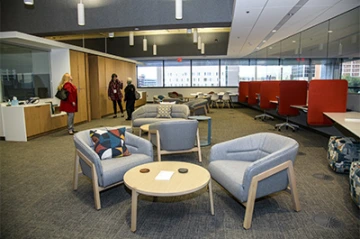Faculty Commons + Advisory Pivots to Support Virtual Collaboration and Innovation
The FC+A opened just before the coronavirus outbreak, and has quickly shifted to support virtual connections for research, collaboration and consultation.

The Faculty Commons + Advisory is a one-stop hub where faculty can relax, connect with one another, and access resources for research and innovation.
In early March, the University of Arizona Health Sciences opened the Faculty Commons + Advisory as an innovative gathering place for faculty across the university to meet, collaborate and get advice. By the end of the month, it had transformed into a virtual collaboration incubator and digital resource to continue its mission during the worldwide COVID-19 pandemic.

The Commons is a casual place where faculty can read newspapers, enjoy a cup of coffee and relax.
“While the way we work may have changed, the importance of our work has not. In many ways, now more than ever, faculty and researchers need the support of the Faculty Commons + Advisory,” said Kaitlyn Armendariz Shergill, manager of outreach and engagement at University of Arizona Health Sciences.
Armendariz Shergill designs and schedules FC+A programming to provide faculty and researchers with easy access to research experts, lectures, and workshops, as well as campus-wide resources designed to serve them, including: HIPAA Privacy Program, Data Science Fellows Program, Research Laboratory and Safety Services, Conflict of Interest Program, Center for Biomedical Informatics and Biostatistics, Arizona FORGE, and many more.
Advancing the Mission
The resource is operating without walls now, but when campus reopens, the FC+A will continue to draw upon its physical design to achieve collaboration and inspiration. The gathering space is nestled just above the Forum, inside the Health Sciences Innovation Building on the Tucson campus.
Designed as two spaces, the Commons is a casual space to relax or meet for small group discussions. Next door is the Advisory, a one-stop hub where faculty will connect with experts from across campus to find resources for advancing their work as they tackle some of the biggest challenges they face in research and education.

Grand opening attendees explore the Advisory inside the Health Science Innovation Building on March 4, 2020.
“We’re building new resources and infrastructure to support collaborative research and innovation across our campuses, and this new facility is a tangible accomplishment. Our vision is to support faculty as we work toward improving health care for all,” said Senior Vice President of Health Sciences Michael D. Dake, MD, at the grand opening event on March 4.
A cornerstone of the Advisory is its ability to offer space for organizations that are physically scattered across campus, so they can hold regular office hours near Health Sciences colleges.
“It’s supposed to be like a city hall, a one-stop shop so you’re not on a scavenger hunt going around to find all of these resources,” Dr. Dake said, and just as city halls throughout the world are now converting to providing online services, so has the FC+A.
As people are scattered even farther in a remote-work reality to help stop the spread of COVID-19, many campus organizations plan to hold dedicated virtual office hours.
“We’re here to connect faculty to the resources they need for their research – and right now that means virtual communication and collaboration,” Armendariz Shergill said.
Problem solving in real time
When the doors reopen, the FC+A will continue to bring people together virtually, as well as once again in person.
At the grand opening in early March, it didn’t take long to see the FC+A concept at work.

Taren Ellis Langford, JD, of the Conflict of Interest office speaks to Esther Sternberg, MD, during the grand opening of the Faculty Commons + Advisory event inside the Health Science Innovation Building.
College of Medicine – Tucson Professor Esther Sternberg, MD, huddled over a table with Taren Ellis Langford, JD, director of the Conflict of Interest Program.
Sternberg, who is research director for the Andrew Weil Center for Integrative Medicine, and director of the Institute on Place Wellbeing & Performance, said the two had been emailing for a while about a specific question on which she had been requesting guidance. When she saw Langford here to meet with Health Sciences folks, Sternberg made her way to the Conflict of Interest table.
“It’s always better to talk in person, because when an issue is complicated, it’s hard to get all the information on email,” Sternberg said. After they talked, she was hopeful. “I think we may have found a solution, or at least we have a way forward.”
“It’s a benefit to us so people can see we’re real people who care about the work we do,” said Langford.
“You help us to navigate this complex maze that hopefully won’t be so complicated,” Sternberg said to Langford.
Photo Gallery: Faculty Commons + Advisory Grand Opening Event – March 4, 2020
Each week the office hours and schedule of workshops will be published in the daily Health Sciences Update email for Health Sciences faculty and staff.
The FC+A is part of the University of Arizona strategic plan, as a component of the Health Sciences Collaborative initiative.

